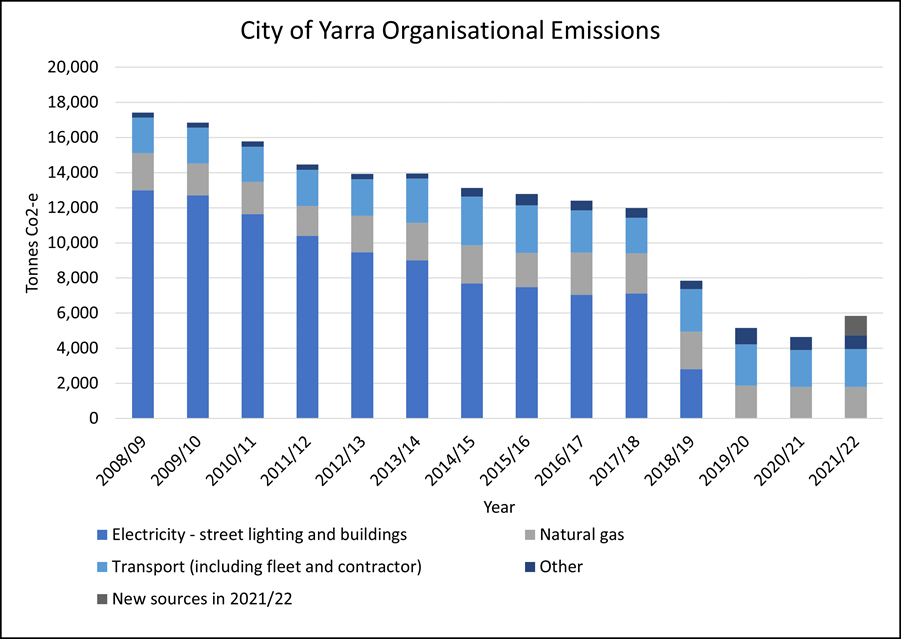
- Yarra's first Climate Emergency Plan
- Our track record in cutting carbon emissions
- An ambition to achieve zero gross emissions from our operations
- Recognition of our sustainability leadership
- A plan for sustainable water use
- Our partners and alliances
Yarra's first Climate Emergency Plan
Yarra was one of the first Councils to declare a climate emergency. Our declaration recognised that the planet’s climate is already too hot and that effort is needed across all levels of government, businesses, and communities to address the climate crisis.
In 2020, Yarra Council endorsed its first Climate Emergency Plan that sets out our priority areas and proposes actions to help tackle climate change over the next four years.
Guided by the plan, we’re reducing our carbon emissions, adapting the city as the climate changes and supporting our community to take climate action.
Since adopting the plan, we have:
- Transitioned twenty-six Council buildings from gas to all-electric, powered by renewables, with only four Council-managed small sites remaining on gas.
- Sped up the roll out of cycling infrastructure by trialling temporary bike lanes to inform permanent upgrades.
- Facilitated the installation of two new fast electric vehicle chargers at the Collingwood Library car park for public use.
- Created climate-adapted green spaces by harvesting more stormwater to irrigate our parks, with over 10% of our total water consumption now coming from alternative sources.
- Introduced zero carbon standards for new commercial and multi-residential developments.
- Removed the planning application fee for solar panels in heritage areas.
- Launched the Take Climate Action program and engaged more than 3,500 people in more than 40 community programs, events, webinars and online recordings.
- Engaged the community around all-electric homes through webinars, videos, web content, online tools and personalised energy advice through our 100% Renewable Yarra initiative.
- Carried out low-cost energy efficiency retrofits on the homes of older people and people with disabilities through the Healthy Homes initiative.
- Delivered the highly successful Community Skills for Climate Action program in partnership with Merri-bek and Darebin Councils.
- Supported more community-led climate action projects through our climate action grants (as part of the Annual Grants program).
- Led a cross-council renewable electricity buying group for large energy using businesses.
- Advocated for urgent climate action by other levels of government.
- Introduced a separate glass recycling service to reduce the carbon emissions associated with glass products and keep material out of landfill.
As part of our continued commitment to reduce carbon emissions we’re sharing a “Roadmap to Zero Advisory Report”. This report will help guide us in working towards zero-net emissions across the entire Yarra community by 2030.
The Roadmap to Zero Advisory Report presents strong roles for Council as an advocate, policy maker and facilitator of climate action . It also acknowledges the joint effort required to drive down emissions by all levels of government, businesses, and the community.
The report is not an endorsed Council document but will inform future planning and decision making. By sharing our Roadmap to Zero, we hope to inspire other councils and businesses on their journeys to zero net emissions.
Our track record in cutting carbon emissions
Since 2008/09, the total emissions from Yarra Council as an organisation have reduced by nearly 70% from 17,726 tonnes of carbon dioxide (tCO2e) in 2008/09 to approximately 5,837 tCO2e in 2020/21 (figure below).

In 2021/22, we were able to identify and quantify several emissions sources which were previously unaccounted for. These included: employee commuting (538.3 tCO2-e), concrete (300.5 tCO2-e), and staff working from home (262 tCO2-e). In alignment with best practice, we will continue to work to identify and account for more sources of emissions from our operations over time. Underlying emissions also increased due to the increase in operations coming out of COVID-19 work from home and service delivery restrictions.
We have achieved these emissions reductions through ongoing commitment and investment in a range of actions:
- All of Council’s electricity needs are met by 100% renewable power as part of the Melbourne Renewable Energy Project.
- We have installed nearly 3,000 solar panels on 42 council buildings.
- 8 ‘Tesla 2’ batteries (108kWh storage capacity) installed in community facilities, including leisure centres, libraries and sports pavilions
- We have 70 electric and hybrid vehicles and bicycles in the Council fleet, including the first Australian-engineered electric tipper truck.
- We are the first local Council in Victoria to implement a multi-site Energy Performance Contract to carry out comprehensive building upgrades. These include lighting, insulation, solar hot water, efficient heating and cooling and guarantee savings of around 2,000 tonnes of carbon emissions each year
- We have conducted energy efficiency retrofits to Council buildings including aquatic centres, town halls, community centres and childcare centres.
- We have had 4,500 streetlights upgraded with efficient lamps including one of Australia's first trials of smart main road lighting.
The main opportunities to further reduce our organisation’s emissions are transitioning away from natural gas and reducing emissions from transport.
An ambition to achieve zero gross emissions from our operations
With Council operations powered by 100% renewable electricity and 10 years as a carbon neutral organisation, we are looking to progress further.
We are working towards achieving gross zero carbon emissions from all Council operations by 2030.
The plans for this are laid out in our “Organisational Zero Emissions Roadmap".
Some key focusses for Yarra to reduce emissions from our operations are:
- Transition existing buildings off gas to be all-electric and highly energy efficient.
- Transition Council fleet and contractor vehicles to be all-electric or zero emissions vehicles.
- Ensure all new Yarra Council buildings are all-electric and zero-net emissions in construction and operation.
- Continue to innovate through integrated energy systems and leading-edge sustainable building design and operations.
- Take a circular economy approach and look at innovative ways to reuse or recycle materials to reduce emissions.
Recognition of our sustainability leadership
Our sustainability profile and programs for the community have been recognised in several awards:
- 2022 We were recognised for our ambition, leadership and transparency on climate action and joined the Carbon Disclosure Project’s (CDP) 2022 A List for cities. There are only seven local governments in Australia and 123 cities globally (among over 1,100 reporting cities) recognised with this top score for climate action. This platform is the central data repository for our membership of key programs such as the Global Covenant of Mayors for Climate and Energy and Race to Zero. See ‘Our partners and alliances’ section below for further information on these.
- 2020 Climate Champion Award from the Cities Power Partnership Climate Awards
- 2017 United Nations Association of Australia World Environment Award - Local Government Climate Action Award - Embedding Climate Adaptation in Local Government
- 2016 Keep Victoria Beautiful Sustainable City of the Year
- 2016 Keep Australia Beautiful Sustainable Cities Award - Community Action and Wellbeing category
A plan for sustainable water use
In 2020, we introduced our 10-year integrated water management plan. The plan lays out our vision, targets and objectives, identifies opportunities to improve sustainable water use across our municipality and helps us implement more innovative approaches to water management.
Since implementing the plan, we've achieved several milestones. This includes reducing our reliance on potable water by over 20 million litres and incorporated new drainage infrastructure into many of our streets.
Here are some of our projects:
- Ramsden Street Oval Carpark Permeable Pavement Trial
- Rutland Street Permeable Pavement Trial
- Curtain Square Stormwater Harvesting Scheme (more to come)
Visit the integrated water management plan page to learn more.
Our partners and alliances
We have strategic partnerships that assist with accelerating climate action. These include:
- The Yarra Energy Foundation (YEF) is an independent, Council-funded organisation working towards a zero-carbon future in the City of Yarra.
- Northern Alliance for Greenhouse Action (NAGA) is a partnership between nine local governments in Melbourne’s north that delivers carbon reduction programs and advocacy across municipal borders.
- Cities Power Partnership (CPP) is Australia’s largest local government climate network, with participants sharing information and building connections to accelerate local action.
- Global Covenant of Mayors for Climate and Energy is the world’s largest global alliance for city climate leadership, with over 10,000 participants promoting and supporting voluntary action to combat the climate emergency and move to a low emissions, resilient society.
- Race to Zero - is a global campaign to build momentum to decarbonisation.
- ICLEI Global network of more than 2,500 local and regional committed to sustainable urban development.
- Climate Emergency Australia: a network of Australian councils that have declared a climate emergency.
